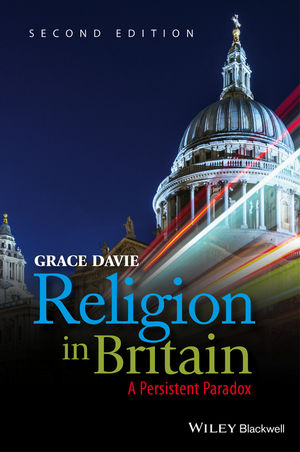Religion in Britain: A Persistent Paradox

Religion in Britain: A Persistent Paradox
Grace Davie
Wiley-Blackwell, 2015
Religion in Britain evaluates and sheds light on the religious situation in twenty-first century Britain; it explores the country’s increasing secularity alongside religion’s growing presence in public debate, and the impact of this paradox on Britain’s society.
- Describes and explains the religious situation in twenty-first century Britain
- Based on the highly successful Religion in Britain Since 1945 (Blackwell, 1994) but extensively revised with the majority of the text re-written to reflect the current situation
- Investigates the paradox of why Britain has become increasingly secular and how religion is increasingly present in public debate compared with 20 years ago
- Explores the impact this paradox has on churches, faith communities, the law, politics, education, and welfare
Author Information
Grace Davie is Professor Emeritus in the Sociology of Religion at the University of Exeter UK and a senior adviser to the Impact of Religion Research Programme at Uppsala University. She is a past-president of the American Association for the Sociology of Religion (2003). Her publications include Religion in Britain since 1945 (Blackwell 1994), Religion in Modern Europe (2000), Europe: the Exceptional Case (2002), and The Sociology of Religion (Sage 2007 and 2013).
Reviews
This is a precise, clear, admirably fair and comprehensive account of religion in Britain, and especially of religious changes over recent decades, that should be necessary reading for anyone interested in the subject. It provides a subtle account of the changing political and cultural background, and also a comparative background in the peripheries of Britain, Europe and North America, and the ‘Global South’. — David Martin, London School of Economics
Davie’s 1994 book was a landmark in the field of the sociology of religion internationally. British religion and society have since changed, and Davie’s thinking has also developed. This new edition is more than an update. It is a masterly review of the contemporary situation – its continuities with Britain’s Christian heritage, as well as the changes. — Rebecca Catto, Coventry University
In this new edition of Religion in Britain, Grace Davie has thoroughly updated her watershed investigation from two decades ago. Now emphasizing more the notion of “vicarious religion” than the much-discussed earlier concept of “believing without belonging”, she surveys the contemporary British religious scene with insight and illumination. Anyone wishing to understand how the British are coming to terms with their religion — past, present, and future — will need to read this valuable book. — John Torpey, City University of New York